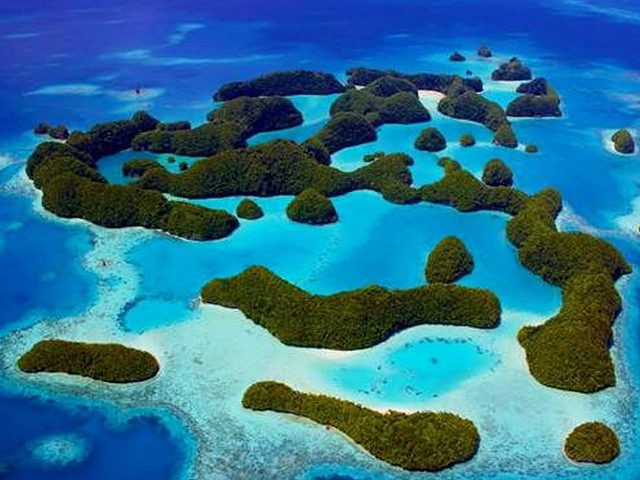The Pacific nation of Palau urged the U.S. this week to build military bases on its island territory amid growing Chinese influence in the western Pacific region.
U.S. Pentagon chief Mark Esper visited Palau last week as part of a tour of the Pacific. It was the first-ever visit to the island by a U.S. defense secretary. During his visit, Esper accused Beijing of a “malign influence” in the region marked by “ongoing destabilizing activities” in the western Pacific Ocean.
Palau President Tommy Remengesau Jr. revealed this week that he sent a hand-delivered letter to Esper during his stay on Palau in which he urged the U.S. to build military infrastructure on the islands, which constitute an archipelago roughly 930 miles east of the Philippines.
“Palau’s request to the U.S. military remains simple – build joint-use facilities, then come and use them regularly,” Remengesau reportedly said in the letter.
According to Agence France-Presse (AFP), the letter said, “the nation of 22,000 was open to hosting land bases, port facilities, and airfields for the U.S. military. Remengesau also suggested a U.S. Coast Guard presence would help Palau patrol its vast marine reserve, which covers an area of ocean the size of Spain and is difficult for the tiny nation to monitor.”
Palau struggles to monitor its own sovereign territory because it has no military. The U.S. is responsible for Palau’s defense under a compact of free association signed with Washington in 1994 upon the island’s independence from five decades of U.S. administration. The U.S. military maintains access to the islands through the deal, although it has no troops permanently stationed in Palau.
“We should use the mechanisms of the compact to establish a regular U.S. military presence in Palau,” Remengesau said in his letter. “The U.S. military’s right to establish defense sites in the Republic of Palau has been under-utilized for the entire duration of the compact.”
U.S. military bases in Palau would increase U.S. military preparedness in the Pacific region while simultaneously boosting the island’s local economy, which has struggled during the coronavirus pandemic, Remengesau said. The pandemic has halted tourism on Palau, which accounts for more than 40 percent of the island’s GDP.
“[Si]nce November 2017, the Chinese government has banned tour operators in … [China from] selling package tours to Palau, with the stroke of a pen knocking out a huge and growing proportion of the tourist market,” the Guardian reported.
The Chinese Communist Party’s ban on Taiwanese tours to Palau was an act of retaliation for the island’s diplomatic recognition of fellow independent island Taiwan, which Beijing claims is a renegade territory. Palau is one of four remaining Pacific nations that recognize Taiwan’s sovereignty after the Solomon Islands and Kiribati switched diplomatic recognition to Beijing in 2019.
Prior to a meeting with U.S. President Donald Trump last year, Remengesau urged for “a stronger U.S. presence in the Pacific” to counter China’s increasing influence over the archipelago and in the western Pacific region.
“There are so many things that the U.S. can [do to] show leadership, as you can see China seems to be the main nation showing initiative and aggressively coming to the Pacific and establishing their mark,” Remengesau said at the time.

COMMENTS
Please let us know if you're having issues with commenting.